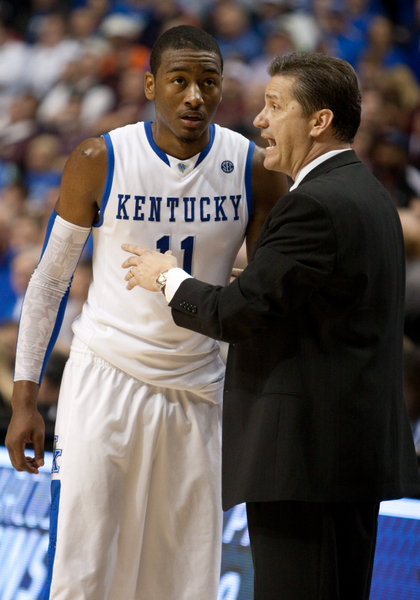Revised Itinerary: Memphis Vacations During Entire 2008 Season
Posted by rtmsf on March 22nd, 2010Perhaps hoping to avoid controversy by releasing the verdict amidst the afterwash of one of the greatest opening weekends in NCAA Tournament history, the NCAA Infractions Appeals Committee this morning finally settled the Derrick Rose issue once and for all: Memphis will be held liable for the presumed culpability of Derrick Rose with respect to his college admissions exam score, and the Tigers must vacate all 38 of their wins from the 2007-08 season. There is no higher authority to which the university can appeal, so this decision is final. Here’s the relevant text from the NCAA release:
In its appeal, the university made two arguments as grounds for reversal of the financial penalty: (1) there was insufficient evidence to find that the university or the student-athlete knew, or had reason to know, that he would become ineligible; and (2) even if the evidence was sufficient to make such a finding, the Committee on Infractions erred by not specifically concluding that the university or the student-athlete knew, or had reason to know, that he would become ineligible. The Infractions Appeals Committee, however, disagreed and upheld the financial penalty. In its report, the Infractions Appeals Committee stated that a letter from the testing agency to the student-athlete “not only made the student-athlete aware that his eligibility was in serious jeopardy, but that he would be declared ineligible if he did not respond to the letter.”
Memphis AD RC Johnson responded with the comment that he is disappointed with the findings, but generally took the high road and pointed toward a bright future for Tiger athletics.
The NCAA is essentially standing behind their ostrich argument here. They’re holding Rose responsible for failing to respond to letters of inquiry about his test score, and they’re holding the school responsible for failure to properly investigate the situation surrounding Rose’s test scores before he played. Even though the NCAA Clearinghouse signed off on Rose to participate in athletics in 2007-08, they obviously believe that Memphis didn’t do enough to vet the situation through their own investigation. But since the NCAA cannot prove that fact, they’re using Rose’s willful ignorance of letters in March and April 2008 from ETS (which Memphis does not receive) to show Rose’s bad faith while folding Memphis’ culpability into it through a failure to act.
Certainly there is plenty of circumstantial evidence of tomfoolery with respect to Rose’s test (allegations of high school grade changes; the test-taking venue change to Detroit; the handwriting analysis), but nothing so apparent that the NCAA could hang its lily-white hat on. Our interpretation of their final ruling looks something like this:
We [the NCAA and Memphis] both know that the player cheated on this test given the increase in his test score; but you [Memphis] rubber-stamped his score based on what he told you. Had you properly reviewed this player’s circumstances, you would have sensed something was rotten in Denmark. Even though we can’t prove that Rose cheated on his test in Detroit, we can prove that he ignored letters questioning him about it, so short of evidence to the contrary, we have no other option than to retroactively make him ineligible.
It’s a convoluted argument and not a very well-designed one, but it appears to be where the NCAA has landed on the matter. Memphis will have to pay back the money earned from the NCAA Tournament’s five wins in 2008 and remove all 38 wins from its record, which has no real effect other than the removal of a banner celebrating that team in the rafters of FedEx Forum.
The big elephant-in-the-room question remains, though, which is whether the vacation of these wins belies a willingness of Kentucky coach John Calipari to pull the ostrich maneuver himself when it comes to recruiting and managing his players. Nothing has been specifically targeted at him by the NCAA or the University of Memphis, but the twin coincidences of using ineligible players due to improper benefits and/or suspect test scores (both here and at UMass) is cause for alarm. It’s certainly one thing if you’re carrying around illicit cash payments yourself or setting up fraudulent exams for players (see: the Harricks), but it’s almost as troubling if you look the other way while such things are going on, perhaps not fully aware of the details but completely certain of the processes to secure desired outcomes. It’s a little analagous to a mob boss who has his henchmen do the dirty work without causing the Don to get his hands soiled, or a crooked politician always looking for plausible deniability for his backroom dealings. We’re not accusing Calipari of specific wrongdoing — far from it, in fact — but to ignore these two situations especially in light of a continued association with a power broker-turned-agent like World Wide Wes is absolutely worth watching. As wonderful it is to watch a player like John Wall perform in this year’s NCAA Tournament, we can’t help but wonder whether his tenure as a collegian will even count two to three years from now. It’s unfortunate to have to think that way, but it’s a very logical byproduct of the prior situations involving this coach at this time.













































Does that mean MSU now gets to advance to the Elite 8 that year? :)
So the NCAA can hold Memphis responsible for something Rose didn’t tell his school, but the NCAA can’t be held responsible for something Rose didn’t tell them (twice)?
Judge, juror, and executioner.